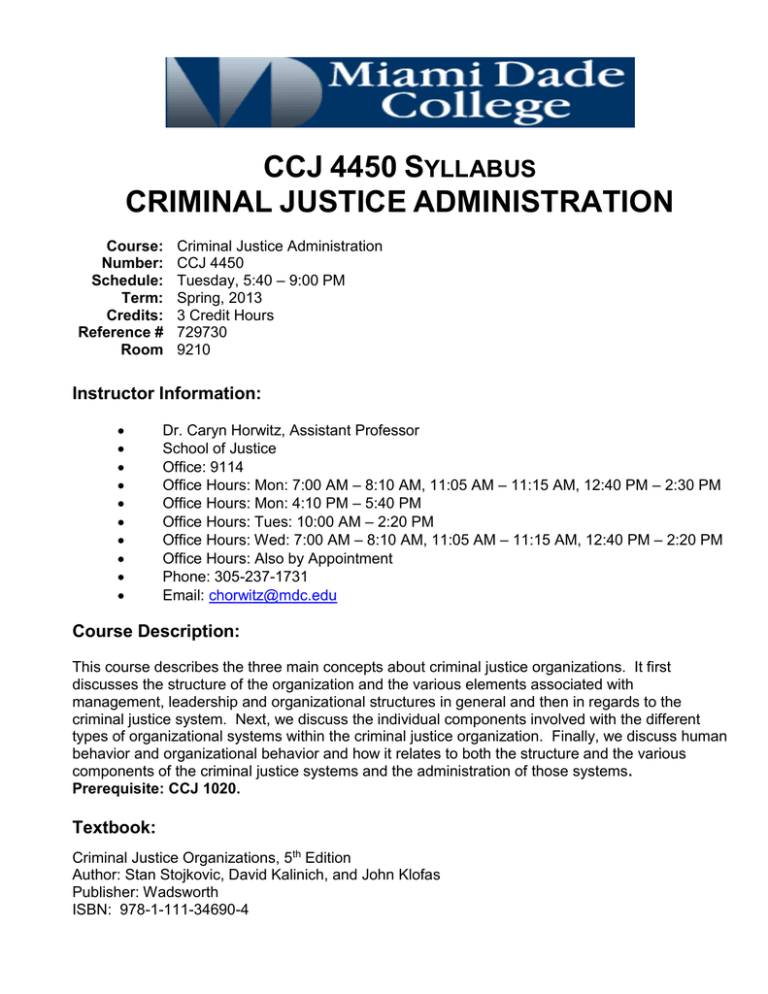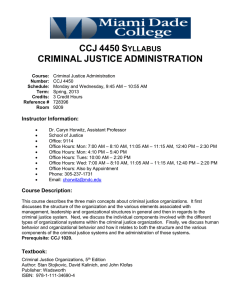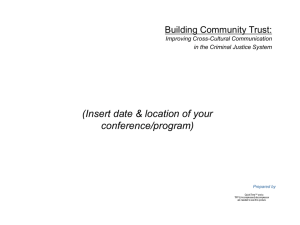CCJ 4450 S
advertisement

CCJ 4450 SYLLABUS CRIMINAL JUSTICE ADMINISTRATION Course: Number: Schedule: Term: Credits: Reference # Room Criminal Justice Administration CCJ 4450 Tuesday, 5:40 – 9:00 PM Spring, 2013 3 Credit Hours 729730 9210 Instructor Information: Dr. Caryn Horwitz, Assistant Professor School of Justice Office: 9114 Office Hours: Mon: 7:00 AM – 8:10 AM, 11:05 AM – 11:15 AM, 12:40 PM – 2:30 PM Office Hours: Mon: 4:10 PM – 5:40 PM Office Hours: Tues: 10:00 AM – 2:20 PM Office Hours: Wed: 7:00 AM – 8:10 AM, 11:05 AM – 11:15 AM, 12:40 PM – 2:20 PM Office Hours: Also by Appointment Phone: 305-237-1731 Email: chorwitz@mdc.edu Course Description: This course describes the three main concepts about criminal justice organizations. It first discusses the structure of the organization and the various elements associated with management, leadership and organizational structures in general and then in regards to the criminal justice system. Next, we discuss the individual components involved with the different types of organizational systems within the criminal justice organization. Finally, we discuss human behavior and organizational behavior and how it relates to both the structure and the various components of the criminal justice systems and the administration of those systems. Prerequisite: CCJ 1020. Textbook: Criminal Justice Organizations, 5th Edition Author: Stan Stojkovic, David Kalinich, and John Klofas Publisher: Wadsworth ISBN: 978-1-111-34690-4 Class Requirements Assignments: You will be required to take two in-class exams. Additionally, you will participate in one group power point presentation based on a research topic approved by your professor. You will also write a research paper based on your research topic. You will also be required to participate in all class discussions. You will be expected to read weekly and daily newspapers and magazines, and be prepared to bring any interesting issues into class. We will discuss group presentation and writing requirements in class. Late Assignment Policy: No late presentations can be done nor will late papers be accepted. Grading Scale and Policy: You can earn up to 500 points in this class. Midterm Exam ==================================== 100 Points Final Exam ======================================= 150 Points Group Presentation ================================== 100 Points Research Paper ==================================== 100 Points Class Attendance and Participation ====================== 50 Points You can earn 5 points for each class meeting. Arrivals 10 minutes after start time and/or departures before the class ends will only earn you a maximum of 3 points for that class meeting. Please see below for electronic device use policy. If I need to ask you to put away your electronic device, you will only earn a maximum of 3 points for that class meeting. Thus, you have the potential of getting 0 to 5 points per class meeting even if you are partially in attendance. For example, if you arrive late and I need to ask you to put away your phone, you will earn only 1 point for that class meeting. Please keep track of your attendance (including late arrivals, early departures, and “caught by professor” electronic use violations). A ====== 440 or Above Points B ====== 390 – 439 Points C ====== 340 – 389 Points D ====== 290 – 339 Points F ====== 289 or Below Points Make-up Exam Policy: No make-up exams will be offered. Class Policies and Methodology Attendance: Attendance will be taken at each class meeting and is expected of each of you. You earn points for attending and participating in class. See above. Electronic Device Use: Please refrain from using any electronic device during class. If you must make an emergency call, please step out of the classroom. Email Policy: Copies of papers and presentations need to be printed and turned into professor. You may email the professor for specific questions that cannot be handled before and/or after class. Also please note the office hours, and visit the professor as often as you want during these hours for specific questions, help with the course, and/or discussion about future education and career plans. 2 Equipment and Supplies: No special supplies and/or equipment to buy except for the textbook used for our class. See above. Professor’s Expectations: You will be expected to take a key role in your learning experience. You will read the textbook, attend class, participate in discussions, do your in-class presentations, write your papers, and take both the mid-term and final exam. Exams will be based on class discussions/lectures and your reading assignments. If you miss class, please get information about covered material from one of your colleagues in the class. Please do not write to me and ask me “Did I miss anything?” Assume you missed something! Methods of Instruction: Lectures and Discussions based on textbook and class participation. Unique Requirements of the Class: Your active participation in your learning experience by sharing in class discussions and bringing current newsworthy issues into class. Class Outline and Assignments: See below for reading assignments, dates for exams, and dates for papers due. College Policies: ATTENDANCE REPORTING: Federal guidelines require that the faculty now report student attendance. Students who have never attended class will be withdrawn prior to the withdrawal date. If a student has attended class and wants to withdraw, they should do so before the withdrawal deadline. If you have attended class but do not complete any assignments and then stop attending, you will receive a grade of F. If you complete an assignment and stop attending, you will receive a grade of F. ACADEMIC HONESTY: You are expected to do your own work. Cheating WILL NOT be tolerated. This includes, but is not limited to, collaboration on exams or quizzes and plagiarized papers. The first incidence will result in a grade of zero for the assignment. A second occurrence will result in a failing grade for the class, removal from the class and possible additional sanctions as determined by the Dean of Students. IMPORTANT NOTE: The course outline below is subject to change by the professor. . CLASS OUTLINE Week 1 – Week of February 11 Introduction: General Discussion 3 Week 2 – Week of February 18 Basic Concepts of Understanding Criminal Justice Organizations/Structure of Criminal Justice Organizations Read Text, Chapters 1 and 2 Week 3 – Week of February 25 The Criminal Justice System in its Environment/Problems of Communication Read Text, Chapters 3 and 4 Week 4 – Week of March 4 Motivation of Personnel Read Text, Chapter 5 Week 5 – Week of March 11 MID-TERM EXAM General Group Discussion Mid-Term, Tuesday, March 12 Week 6 – Week of March 18 Job Design/Leadership Read Text, Chapters 6 and 7 Week 7 – Week of March 25 Leadership/Personnel Evaluation and Supervision Read Text, Chapter 8 Week 8 – Week of April 1 Occupational Socialization Read Text, Chapter 9 Group Presentations – ALL Copies of Presentations and All Papers Due on Tuesday Week 9 – Week of April 8 Power and Political Behavior/Organizational Conflict Read Text, Chapters 10 and 11 Group Presentations 4 Week 10 – Week of April 15 Decision Making/Organizational Effectiveness Read Text, Chapters 12 and 13 Group Presentations Week 11 – Week of April 22 Change and Innovation Read Text, Chapter 14 Week 12 – Week of April 29 FINAL EXAM Final Exam Course Competencies: Competency 1: The student will demonstrate knowledge of the organizational structure and culture of a Law Enforcement agency by: a. b. c. d. explaining why law enforcement culture is important recognizing how the culture develops identifying how the culture changes comparing and contrasting various cultures within agencies Competency 2: The student will demonstrate knowledge of the various leadership and behavioral styles by: a. b. c. d. identifying qualities of a successful manager exploring styles of leadership reviewing effective leadership practices and organizational teamwork assessing approaches to the organizational development process Competency 3: The student will analyze the organizational environment by: a. b. c. d. reviewing the principles of motivation and Motivation-Hygiene Theory defining the hierarchy of effective communication describing McGregor’s Theory X and Theory Y process discussing the Immaturity-Maturity Theory and Expectancy Theory Competency 4: The student will analyze transactional analysis by: a. reviewing behavioral models and the change process b. defining transactions and communications c. distinguishing between basic life position, organizational sanctions, and organizational games d. discussing time structuring 5 Competency 5: The student will explore the principles of management by objective by: a. reviewing the MBO system, its values, beliefs, and goals b. producing an action plan c. developing an evaluation plan by establishing measurable objectives, designing an evaluation, specifying data collection procedures, and specifying data reduction and analysis methods d. evaluating the pros and cons of MBO Competency 6: The student will describe the nature of productivity by: a. b. c. d. understanding how to determine productivity reviewing what is meant by “post report reflections” learning how to treat productivity, the news media, and selected officials understanding productivity and social concerns and how productivity will affect one’s future Competency 7: The student will demonstrate knowledge of budgeting and managing costs by: a. b. c. d. defining the purpose of a budget comparing and contrasting various types of budgets learning the stages of the budgeting process creating a budget Competency 8: The student will explore modern law enforcement management and power issues by: a. b. c. d. defining power and management contrasting the uses of formal and informal power exploring approaches to the use of power, including manipulation, threats, and needling analyzing the reasons for using power Competency 9: The student will demonstrate knowledge of civil liability by: a. identifying civil rights violations b. comparing negligence and liability in the selection and training of employees c. exploring civil liability in law enforcement Competency 10: The student will demonstrate knowledge of the accreditation process of Law Enforcement agencies by: a. b. c. d. defining accreditation comparing the liability and benefits of accreditation reviewing accreditation and agency participation tracing the history and origin of national accreditation processes 6 Learning Outcomes: 1. The student will be able to explain through oral presentation the three main concepts associated with criminal justice systems 2. The student will be able to demonstrate the types of problems associated with individuals in the criminal justice system 3. The student will demonstrate an understanding of the relationship between structures, people and human behavior, and the impact of management on criminal justice systems, through case studies and research activities. 7


